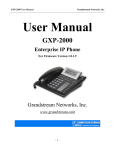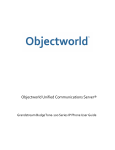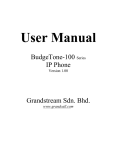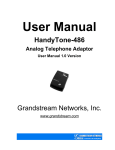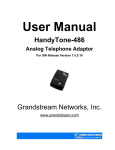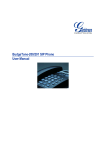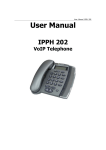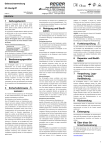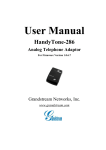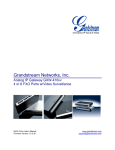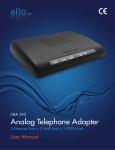Download BudgeTone-100Series IP Phone Grandstream
Transcript
User Manual BudgeTone-100 Series IP Phone Version 1.0.5.11 Grandstream Networks, Inc. www.grandstream.com Grandstream Networks, Inc. BudgeTone-100 User Manual Table of Contents 1 WELCOME -3- 2 INSTALLATION -4- 2.1 WHAT IS INCLUDED IN THE PACKAGE 2.2 SAFETY COMPLIANCES 3 PRODUCT OVERVIEW -5-5-6- 3.1 KEY FEATURES 3.2 HARDWARE SPECIFICATION -6-7- 4 BASIC OPERATIONS -8- 4.1 GET FAMILIAR WITH LCD 4.2 GET FAMILIAR WITH KEYPAD 4.3 MAKE PHONE CALLS 4.3.1 Make Calls Using Regular Phone or Extension Numbers 4.3.2 Make Calls using IP Address 4.3.3 Answer an Incoming Call 4.3.4 Handset Mode and Speakerphone Mode 4.3.5 Call Hold 4.3.6 Flash 4.3.7 Call Transfer 4.4 CALL FEATURES 5 CONFIGURATION GUIDE -8- 10 - 11 - 11 - 11 - 13 - 13 - 13 - 13 - 13 - 17 - 18 - 5.1 CONFIGURATION WITH KEYPAD 5.2 CONFIGURATION WITH WEB BROWSER 5.2.1 Access the Web Configuration Menu 5.2.2 Configuration Menu 5.2.3 Saving the Configuration Changes 5.2.4 Rebooting the phone from remotely 5.3 CONFIGURATION THROUGH A CENTRAL SERVER - 18 - 21 - 21 - 22 - 33 - 33 - 34 - 6 SOFTWARE UPGRADE - 35 - 6.1 UPGRADE WITH TFTP - 35 - 7 CONNECTION DIAGRAM - 37 - 8 RESTORE FACTORY DEFAULT SETTING - 38 - -2- Grandstream Networks, Inc. BudgeTone-100 User Manual 1 Welcome Congratulations on becoming an owner of BudgeTone-100 IP telephone! You made an excellent choice and we hope you will enjoy all its capabilities. Grandstream's award-wining BudgeTone-100 series of SIP phones are innovative IP telephones that offer a rich set of functionality and superb sound quality at ultraaffordable price. They are fully compatible with SIP industry standard and can interoperate with many other SIP compliant devices and software on the market. This document is subject to changes without notice. The latest electronic version of this user manual can be downloaded from the following location: http://www.grandstream.com/user_manuals/budgetone100.pdf Grandstream Networks, Inc. -3- Grandstream Networks, Inc. BudgeTone-100 User Manual 2 Installation BudgeTone-100 series IP phones are designed to look and feel like standard telephones. The following photo illustrates the appearance of a BudgeTone IP phone and the use of its key buttons. LCD Menu Volume & Menu Browser Key Out-Call Log Incoming Callers Log Message Hold Transfer Conference Flash MUTE/Delete SEND/(Re)Dial Speakerphone -4- Grandstream Networks, Inc. BudgeTone-100 User Manual 2.1 What is Included in the Package The BudgeTone-100 phone package contains: 1) One BudgeTone-100 phone 2) One universal power adaptor 3) One Ethernet cable 2.2 Safety Compliances The BudgeTone-100 phone is compliant with various safety standards including FCC/CE. Its power adaptor is compliant with UL standard. The phone should only operate with the universal power adaptor provided with the package. Damages to the phone caused by using other unsupported power adaptors would not be covered by the manufacturer’s warranty. -5- Grandstream Networks, Inc. BudgeTone-100 User Manual 3 Product Overview Grandstream IP Phone is a next generation IP network telephone based on industry open standard SIP (Session Initiation Protocol). Built on innovative technology, Grandstream IP Phone features market leading superb sound quality and rich functionalities at massaffordable price. 3.1 Key Features • Support SIP 2.0, TCP/UDP/IP, PPPoE, RTP/RTCP, HTTP, ARP/RARP, ICMP, DNS, DHCP, NTP/SNTP, TFTP protocols • Support NAT traversal using IETF STUN and Symmetric RTP • Advanced Digital Signal Processing (DSP) technology to ensure superior hifidelity audio quality, interoperable with various 3rd party SIP end user device, Proxy/Registrar/Server and Gateway products • Advanced and patent pending adaptive jitter buffer control, packet delay and loss concealment technology • Support popular codecs including G711 (a-law and u-law), G722, G.723.1 (5.3K/6.3K), G.726 (40K/32K/24K/16K), G.728, G.729A/B and iLBC. Dynamic negotiation of codec and voice payload length • Support standard voice features such as Caller ID Display or Block, Call Waiting, Call Hold, Call Transfer, Do-Not-Disturb, Flash, Call Forwarding, in-band and out-of-band DTMF(RFC2833), SIP INFO, Dial Plans, Off-Hook Auto Dial, Auto Answer, Early Dial and Speed Dial, etc. • Full duplex hands-free speakerphone, redial, call log, volume control, voice mail with indicator, downloadable ring tone, etc. • Support Silence Suppression, VAD (Voice Activity Detection), CNG (Comfort Noise Generation), Line Echo Cancellation (G.168) and AGC (Automatic Gain Control) • Support DIGEST authentication and encryption using MD5 and MD5-sess) • Provide easy configuration through manual operation (phone keypad), Web interface or automated provisioning via central configuration through secure TFTP file for mass deployment • Support for Layer 2 (802.1Q VLAN, 802.1p) and Layer 3 QoS (ToS, DiffServ, MPLS) • NAT friendly remote software upgrade capability (via TFTP) even from behind firewall/NATs • Support DNS SRV Look up and SIP Server Fail Over (pending) -6- Grandstream Networks, Inc. BudgeTone-100 User Manual 3.2 Hardware Specification There are three models in the BudgeTone-100 family, namely: BudgeTone-101 BudgeTone-102 The table below describes the difference among these models. Model BudgeTone-101 BudgeTone-102 LAN interface Phone Case 1xRJ45 10Base-T 25-button keypad 12-digit caller ID LCD Universal Switching Power Adaptor Dimension Input: 100-240VAC Output: +5VDC, 1.2A, UL certified 18cm (W) 22cm (D) 6.5cm (H) 2 lbs (0.9 kg) 32 - 104oF 0 - 40oC 10% - 95% (non-condensing) FCC/CE/C-Tick 2xRJ45 10Base-T 25-button keypad 12-digit caller ID LCD Same as left Weight Operating Temperature Humidity Compliance -7- Same as left Same as left Same as left Same as left Same as left Grandstream Networks, Inc. BudgeTone-100 User Manual 4 Basic Operations 4.1 Get Familiar with LCD BudgeTone-100 phone has a numeric LCD of 64mmx24mm size and a backlight. Here is the display when all segments illuminate: 010 上午 下午 AM PM The LCD is equipped with a backlight. When the phone is configured properly and in the normal idle state, the backlight is off. Whenever an event occurs, the backlight turns on automatically and brings the user’s attention. Icon LCD Icon Definitions Network Status Icon: FLASH in the case of Ethernet link failure OFF if IP address or SIP server is not found ON if IP address and SIP server are located Phone Status Icon: OFF when the handset is on-hook ON when the handset is off-hook Speaker Phone Status Icon: FLASH when phone rings or a call is pending OFF when the speakerphone is off ON when the speakerphone is on -8- Grandstream Networks, Inc. BudgeTone-100 User Manual Alarm Clock Status Icon: OFF when the alarm clock is not set ON when the alarm clock is set Lock Status Icon: OFF when the lock is set ON when the lock is not set 010 Encryption Status Icon: OFF when the voice encryption is off ON when the voice encryption is on Handset and Speakerphone Volume Icons: 0-7 scales to adjust handset / speakerphone volume Real-time Clock: Synchronized to Internet time server Time zone configurable via web browser Call Logs: 01-99 for CALLED history (dialed number) 01-99 for CALLERS history (caller ID) AM PM Time Icon: AM for the morning PM for the afternoon IP Address Separator Icons: Three icons combine to indicate valid IP address Numerical Numbers and Characters: 0-9 *=└ #=┘ A, b, C, c, d, E, F, G, g, H, h, I, J, (k), L, (m), n, O, o, P, q, r, S, t, U, u, (v, w, x), y, (z) -9- Grandstream Networks, Inc. BudgeTone-100 User Manual 4.2 Get Familiar with Keypad BudgeTone-100 phone has a 25-button keypad. Underneath the keypad, there are 4 LEDs in red color. Key Button Key Button Definitions 0 - 9, *, # Digit, star and pound keys are usually used to make phone calls ↓ Next menu item when phone is in IDLE mode Or reduce handset/speakerphone volume ↑ Previous menu item when phone is in IDLE mode Or increase handset/speakerphone volume MENU Enter MENU mode when phone is in IDLE mode. It is also the ENTER key once entering MENU CALLED Display the phone numbers called CALLERS Display the caller IDs MESSAGE Enter to retrieve voice mails or other messages HOLD TRANSFER CONFERENCE FLASH MUTE/DEL Temporarily hold the active call Transfer the active call to another number Enter 3-way conferencing call Flash event to switch between two lines Mute an active call; or Delete a key entry, call log, voice mail and etc SEND/(RE)DIAL Dial a new number or Redial the number last dialed. After entering the phone number, pressing this key would force a call to go out immediately before timeout SPEAKERPHONE Enter hands-free mode - 10 - Grandstream Networks, Inc. BudgeTone-100 User Manual 4.3 Make Phone Calls 4.3.1 Make Calls Using Regular Phone or Extension Numbers There are four ways to make phone calls: 1. Pick up handset or press SPEAKERPHONE button, and then enter the phone numbers 2. Press the SEND/REDIAL button directly to redial the number just called. Once pressed, the last dialed number will be displayed on the LCD as the corresponding DTMF tones are played out and an outgoing call is sent. 3. Browse the CALLED history and press the SEND/REDIAL button. Pick up the handset or press the speakerphone button, and then press the “Called” button to browse through the last 10 numbers dialed out. Once the desired number is identified and displayed on the LCD screen, press the SEND/(Re)Dial button and a new call to that displayed number will be sent out immediately. 4. Browse the CALLERS history and press the SEND/REDIAL button Pick up the handset or press the speakerphone button, then press the “Callers” button to browse thru the last 10 caller IDs received. Once the desired number is identified and displayed on the LCD screen, press the SEND/(Re)Dial button and a new call to that displayed number will be sent out immediately. Examples: If the phone is configured with a user part of “1000” with a SIP proxy, then to dial the user extension “1008”, simply just dial 1008 and then press the “SEND/(Re)Dial” button. If the phone is configured with a regular PSTN number 16172223333 with a service provider’s server, then to dial any other PSTN number (say, 16266667890) will be simply to dial that number (16266667890) as if you were calling from a regular analog phone, followed by pressing the “SEND/(Re)Dial” button. If the “SEND/(Re)Dial” button is not pressed, the phone will wait for about 5 seconds before initiating the call. 4.3.2 Make Calls using IP Address Direct IP calling allows 2 phones to talk to each other in an ad hoc fashion without a SIP proxy. VoIP calls can be made between two phones if • both phones have public IP addresses, or • both phones are on a same LAN using private or public IP addresses, or - 11 - Grandstream Networks, Inc. BudgeTone-100 User Manual • both phones can be connected through a router using public or private IP addresses. To make a direct IP calling, first pick up the phone or turn on the speakerphone, then press “Menu” button followed by the 12-digit target IP address. If there is a user part, press “Menu” button and then the encoded user part, followed by *3 (encoding for “@”) and then followed by the 12-digit target IP address. Destination ports can also be specified using *4 (encoding for “:”) followed by the encoded port number. The follow is a table of the encoding scheme for the most commonly used characters: 00 01 02 03 04 05 06 07 08 09 *0 *1 *2 *3 *4 0 1 2 3 4 5 6 7 8 9 . (dot character) _ (underscore character) - (hyphen character) @ : (column character) Examples: If the target IP address is 192.168.0.160, the dialing convention is Menu_key 192168000160 followed by pressing the “(Re)Dial” button or the “#” key is it is configured as a send key. In this case, the default destination port 5060 is used if no port is specified. If the target IP address/port is 192.168.1.20:5062, then the dialing convention would be: Menu_key 192168001020*45062 followed by pressing the “(Re)Dial” button or the “#” key is it is configured as a send key. - 12 - Grandstream Networks, Inc. BudgeTone-100 User Manual One thing need to notify is that in the phone’s configuration page, the “Use Random Port” option should be set to “No” if you make direct IP calling in the same LAN segment. 4.3.3 Answer an Incoming Call There are two ways to answer an incoming call: 1. Pick up the handset to answer the call normally 2. Press the SPEAKERPHONE button to answer in speakerphone mode 4.3.4 Handset Mode and Speakerphone Mode Handset mode and Speakerphone mode cannot be enabled at the same time. Pressing the hook-switch or Speakerphone button would toggle the phone between these two modes. 4.3.5 Call Hold While in conversation, pressing the “Hold” button will put the remote end on hold. This is achieved by sending a Re-INVITE with “a=sendonly” attribute and a zero IP address for media in the SDP message. Pressing the “Hold” button again will release the previously Hold state and the bi-directional media will resume. This is triggered by sending another Re-INVITE with “a=sendrecv” attribute and a non-zero IP address for media in the SDP message. 4.3.6 Flash This button is equivalent to putting an active call on Hold and then switching to the other voice channel. If the other channel has an active conversation going on, this is essentially a switching of the “talking” channel and the other channel will be activated. If the other channel is idle with no active conversation going on, then the user will hear a dial tone. 4.3.7 Call Transfer The user can transfer an active call to a third phone by using the “Transfer” button. The sequence is like this: The user presses the “Transfer” button and if the other voice channel is available (i.e., there is no other active conversation besides the current one), - 13 - Grandstream Networks, Inc. BudgeTone-100 User Manual he/she will hear a dial tone. He/She can then dial the 3rd phone and then hangs up his own phone. Two kinds of blind call transfers are supported: using REFER and using BYE/Also. The SIP message flow based on SIP REGER method looks something like this: - 14 - Grandstream Networks, Inc. BudgeTone-100 User Manual Call Flow Diagram For Blind Call Transfer Transferee Transferor Recipient INVITE 100/180/200 ACK RTP Media REFER 202 NOTIFY 200 BYE 200 INVITE 100/180/200 ACK RTP Media - 15 - Grandstream Networks, Inc. BudgeTone-100 User Manual The SIP message flow based on BYE/Also: method looks something like this: Transferee Transferor Recipient INVITE 100/180/200 ACK RTP Media REFER 501 Not Implemented BYE with “Also:” 200 INVITE 100/180/200 ACK RTP Media - 16 - Grandstream Networks, Inc. BudgeTone-100 User Manual 4.4 Call Features Following table shows the call features of BudgeTone series phone. Dial Key *70 Call Features Do not disturb, it will give caller busy tone when called. This setting will be released when user hangs up the phone. *72 Unconditional Call Forward. To use this feature, dial “*72” and get the dial tone. Then dial the forward number and hang up. *73 Cancel Unconditional Call Forward To cancel “Unconditional Call Forward”, dial “*73” and get the dial tone, then hang up. *90 Busy Call Forward To use this feature, dial “*90” and get the dial tone. Then dial the forward number and hang up. *91 Cancel Busy Call Forward To cancel “Unconditional Call Forward”, dial “*91” and get the dial tone, then hang up *92 Delayed Call Forward To use this feature, dial “*92” and get the dial tone. Then dial the forward number and hang up. *93 Cancel Delayed Call Forward To cancel this Forward, dial “*93” and get the dial tone, then hang up Flash/Hook When in conversation, this action will switch to the new incoming call if user heard the call waiting sound. When in conversation and no incoming call heard, this action will switch to a new channel for a new call. - 17 - Grandstream Networks, Inc. BudgeTone-100 User Manual 5 Configuration Guide 5.1 Configuration with Keypad When the phone is on-hook, press the MENU button to enter MENU state. When the phone goes off-hook or a call comes in, the phone automatically exits the MENU state and prepare for the call. It also exits the MENU state if left idle for 20 seconds. Here are the Menu options supported: Menu Item Menu Functions 1 Display “[1] dhcP On ” or “[1] dhcP oFF” for the current selection Press Menu to enter edit mode Press ‘↓’ or ’↑’ to toggle the selection Press Menu to save and exit Must recycle power to take effect 2 Display “[2] IP Addr ” Press Menu to display the current IP address Enter new IP address if DHCP is OFF Press ‘↓’ or ’↑’ to exit Press Menu to (save and) exit Must recycle power to take effect 3 Display “[3] SubNet ” Press Menu to display the Subnet address Enter new Subnet address if DHCP is OFF Press ‘↓’ or ’↑’ to exit Press Menu to (save and) exit Must recycle power to take effect 4 Display “[4] routEr ” Press Menu to display the Router/Gateway address Enter new Router/Gateway address if DHCP is OFF Press ‘↓’ or ’↑’ to exit Press Menu to (save and) exit Must recycle power to take effect - 18 - Grandstream Networks, Inc. BudgeTone-100 User Manual Menu Item Menu Functions 5 Display “[5] dnS ” Press Menu to display the DNS address Enter new DNS address if DHCP is OFF Press ‘↓’ or ’↑’ to exit Press Menu to (save and) exit Must recycle power to take effect 6 Display “[6] tFtP ” Press Menu to display the TFTP address Enter new TFTP server address Press ‘↓’ or ’↑’ to exit Press Menu to save and exit 7 Display “[7] G-711u 2” Press Menu to select new codec Press ‘↓’ or ’↑’ to browse a list of available codecs line 1 “ - G-711A 2” 2 “ - G-722 2” 3 “ - G-723 1” 4 “ - G-726 2” 5 “ - G-728 8” 6 “ - G-729 2” 7 “ - iLBC 1” Press 1 to 9 to indicate number of frames per TX packet Press Menu to save and exit. The codec selected takes effect immediately. No power cycle needed 8 Display “[8] SIP SP-1” Press Menu to display the SIP Server/Service Provider Press ‘↓’ or ’↑’ to browse the valid SIP Server (1-9) Press Menu to save and exit SIP Server(s) must be configured via Web browser Only configured SIP server(s) are displayed Take effect immediately - 19 - Grandstream Networks, Inc. BudgeTone-100 User Manual Menu Item Menu Functions 9 Display “[9] codE rEL” Press Menu to display the code releases Press ‘↓’ or ’↑’ to browse line 1 “b 2004-06-12” – date: boot code 2 “ 1. 0. 0.18” – version: boot code 3 “P 2004-06-21” – date: phone code 4 “ 1. 0. 5. 3” – version: phone code 5 “c 2004-05-06” – date: vocoder 6 “ 1. 0. 0. 6” – version: vocoder 7 “h 2004-06-17” – date: web server 8 “ 1. 0. 0. 36” – version: web server 9 “1r 2004-05-12” – date: 1st ring tone 10 “ 1. 0. 0. 0” – version: ring tone 11 “2r 2004-05-12” – date: 2nd ring tone 12 “ 1. 0. 0. 0” – version: ring tone 13 “3r 0000-00-00” – date: 3rd ring tone 14 “ 0. 0. 0. 0” – version: ring tone (all zeroes means unavailable or unsupported) Press Menu to exit, take effect immediately 10 Display “[10] Phy Addr” Press Menu to display the physical / MAC address Press Menu, ‘↓’ or ’↑’ to exit 11 Display “[11] ring 0” Press Menu to hear the selected ring tone, press ‘↓’ or ’↑’ to select the stored ring tones. Now only 3 are available, ring 0 (default), ring 1 and ring 2. ring 3 is unavailable or unsupported. Press Menu to select and exit, take effect immediately Display “ -- rESEt --”, please be very CAREFUL here A> Key in the physical / MAC address on back of the phone, Press Menu, phone will be reset back to FACTORY DEFAULT setting, all your setting will be erased and gone B> Press Menu without key in anything, phone will function the same as power cycle / reboot - 20 - Grandstream Networks, Inc. BudgeTone-100 User Manual Menu Item Menu Functions Others When phone is powered on and time is displayed • Press ‘↓’ or ’↑’, Display “ ring [4] ”, press ‘↓’ or ’↑’ again to hear and adjust the ring tone volume, from 0 (off) to 7 (maximum), to designed one, then off and on the handset to set the ring tone volume • Press “SPEAKERPHONE” button, or off hook and pick up handset, press ‘↓’ or ’↑’ to adjust the speakerphone or phone volume 5.2 Configuration with Web Browser BudgeTone-100 series IP phone has an embedded Web server that will respond to HTTP GET/POST requests. It also has embedded HTML pages that allow a user to configure the IP phone through a Web browser such as Microsoft’s IE. 5.2.1 Access the Web Configuration Menu The IP Phone Web Configuration Menu can be accessed by the following URI: http://Phone-IP-Address, where the Phone-IP-Address is the IP address of the phone. There are two ways to retrieve this IP address from the phone: 1) When the phone is in on-hook state, press Menu button and then the browsing arrow keys to check “[2] IP Addr ” 2) When the phone is in off-hook or speakerphone state, simply press Menu button Once this request is entered and sent from a Web browser, the IP phone will respond with the following login screen: Welcome to Grandstream IP Phone Password Login The password is case sensitive and the factory default password is lower case ‘admin’. - 21 - Grandstream Networks, Inc. BudgeTone-100 User Manual 5.2.2 Configuration Menu After key in the correct password in the login screen, the embedded web server inside the IP phone will respond with the Configuration Menu screen. It will be displayed like following. You will know the MAC address of the phone, product model, software/firmware version and the available custom ring tones from the showed page. Grandstream IP Phone Configuration MAC Address: Product Model: Software Version: Custom Ring Tone: 00.0B.82.00.A1.25 BT100 Program--1.0.5.3 Bootloader--1.0.0.18 HTML--1.0.0.36 VOC--1.0.0.6 ring1--1.0.0.0 ring2--1.0.0.0 ring3--0.0.0.0 (all zeroes means unavailable or unsupported) Admin Password: IP Address: (password to configure this IP phone) dynamically assigned via DHCP (default) or PPPoE (will attempt PPPoE if DHCP fails and following is non-blank) PPPoE account ID: PPPoE password: Use this DNS server (if specified): 0 . 0 . 0 . 0 statically configured as: IP Address: SIP Server: Outbound Proxy: SIP User ID: Authenticate ID: 192 . 168 . 0 . 160 Subnet Mask: 0 . 0 . 0 . 0 Default Router: 0 . 0 . 0 . 0 DNS Server 1: 0 . 0 . 0 . 0 DNS Server 2: 0 . 0 . 0 . 0 (e.g., sip.mycompany.com, or IP address) (e.g., proxy.myprovider.com, or IP address, if any) (the user part of an SIP address) (can be identical to or different from SIP User ID) Authenticate Password: - 22 - Grandstream Networks, Inc. BudgeTone-100 User Manual Name: (optional, e.g., John Doe) Advanced Options: Preferred Vocoder: choice 1: (in listed order) choice 2: current setting is "G723" choice 4: current setting is "G729" choice 5: current setting is "G726-32" choice 6: current setting is "G728" choice 7: current setting is "iLBC" choice 8: current setting is "G722" 6.3kbps encoding rate iLBC frame size: Silence Suppression: Voice Frames per TX: Layer 3 QoS: current setting is "PCMA" choice 3: G723 rate: iLBC payload type: current setting is "PCMU" 20ms 99 30ms (between 96 and 127, default is 98) No Yes 2 (up to 10/20/32/64 for G711/G726/G723/other codecs respectively) 48 (Diff-Serv or Precedence value) Layer 2 QoS: 802.1Q/VLAN Tag Use DNS SRV: No Yes User ID is phone number: No Yes SIP Registration: Yes No Yes No Unregister On Reboot: Register Expiration: 60 Early Dial: Use # as Dial Key: local SIP port: 0 802.1p priority value 0 (0-7) (in minutes. default 1 hour, max 45 days) No Dial Plan Prefix: No Key Entry Timeout: 5.3kbps encoding rate Yes (use "Yes" only if proxy supports 484 response) (this prefix string is added to each dialed number) 4 (in seconds, default is 4 seconds) No 5060 Yes (if set to Yes, "#" will function as the "(Re-)Dial" key) (default 5060) - 23 - Grandstream Networks, Inc. BudgeTone-100 User Manual local RTP port: 5004 Use random port: No NAT Traversal: No (1024-65535, default 5004) Yes Yes, STUN server is: keep-alive interval: Use NAT IP TFTP Server: Voice Mail UserID: SUBSCRIBE for MWI: 20 (URI or IP:port) (in seconds, default 20 seconds) (if specified, this IP address is used in SIP/SDP message) 67 . 153 . 142 69 . (for remote software upgrade and configuration) (User ID/extension for 3rd party voice mail system) No, do not send SUBSCRIBE for Message Waiting Indication Yes, send periodical SUBSCRIBE for Message Waiting Indication Auto Answer: Offhook Auto-Dial: No (User ID/extension to dial automatically when offhook) Enable Call Features: No locally) Disable CallWaiting: No Send DTMF: in-audio DTMF Payload Type: Send Flash Event: NTP Server: Time Zone: Date Display Format: Yes Yes (if Yes, Call Forwarding & Do-Not-Disturb are supported Yes via RTP (RFC2833) via SIP INFO 101 No Yes (Flash will be sent as a DTMF event if set to Yes) time.nist.gov (URI or IP address) current setting is "GMT-5:00 (US Eastern Time, New York)" Year-Month-Day Month-Day-Year Day-Month-Year Daylight Savings No Time: time) Default Ring Tone: Yes (if set to Yes, display time will be 1 hour ahead of normal system ring tone custom ring tone 1, used if incoming caller ID is - 24 - Grandstream Networks, Inc. BudgeTone-100 User Manual custom ring tone 2, used if incoming caller ID is custom ring tone 3, used if incoming caller ID is Send Anonymous: No Yes (caller ID will be blocked if set to Yes) Lock keypad update: No Yes (configuration update via keypad is disabled if set to Yes) Update Cancel - 25 - Reboot Grandstream Networks, Inc. BudgeTone-100 User Manual The definitions for all the configuration parameters in the Configuration Menu are: Admin Password This contains the password to access the Web Configuration Page. This field is case sensitive and maximum length is 16 characters. There are 2 modes under which the IP phone can operate: 1. DHCP (default) or PPPoE Mode If DHCP mode is enabled (default), then all the field values for the Static IP mode are not used (even though they are still saved in the Flash memory) and the IP phone will acquire its IP address from the first DHCP server it discovers on the LAN it attaches to. In addition, the phone will attempt PPPoE if DHCP fails. Be careful if the PPPoE account ID or password field is not empty, the phone will try PPPoE from then on and never use DHCP. So leave these two fields BLANK if using DHCP. IP Address With this feature, the phone can be directly connected to ISP or broadband service providers’ Cable or DSL modem. Use this DNS server (if specified), any IP put here will become the primary DNS server, if also the other field “Use DNS SVR” is set to “Yes”. This helps in some cases if the DNS server get from DHCP or PPPoE not working properly, client can put own DNS server here. Default is blank and “Use DNS SVR” is “No”. 2. Static IP Mode If Static IP mode is selected, then the IP address, Subnet Mask, Default Router IP address, DNS Server 1 (primary), DNS Server 2 (secondary) fields will need to be configured. These fields are reset to zero by default. SIP Server This field contains the URI string or the IP address (and port, if different from 5060) of the SIP proxy server. e.g., the following are some valid examples: sip.my-voip-provider.com, or sip:mycompany-sip-server.com, or 192.168.1.200:5066 - 26 - Grandstream Networks, Inc. BudgeTone-100 User Manual Outbound Proxy This field contains the URI string or the IP address (and port, if different from 5060) of the outbound proxy. If there is no outbound proxy, this field SHOULD be left blank. If not blank, all outgoing requests will be sent to this outbound proxy. SIP User ID This field contains the user part of the SIP address for this phone. e.g., if the SIP address is: sip:my_user_id@my_provider.com, then the SIP User ID is: my_user_id. Please do NOT include the preceding “sip:” scheme or the host portion of the SIP address in this field. Authenticate ID This field contains the login ID used for SIP authentication. Typically, this is the account number on an SIP server for this IP phone. It can be the same as or different from the above SIP User ID, depending on whether a separate account ID is used for authentication. Authenticate Password This field contains the password used for SIP authentication. It is used together with the above SIP User ID. Name This field contains user’s real name, it’s optional Preferred Vocoder The BudgeTone IP phone supports up to 8 different vocoder types including G711-ulaw, G711-alaw, G722, G723, G729A/B, G726-32 (ADPCM), G728 and iLBC. Depending on the product model, some of these codecs may not be provided in standard release. A user can configure codecs in a preference list that will be included with the same preference order in SDP message. The first vocoder in this list can be entered by choosing the appropriate option in “Choice 1”. Similarly, the last vocoder in this list can be entered by choosing the appropriate option in “Choice 8”. G723 Rate This defines the encoding rate for G723 codec. By default, 6.3kbps rate is chosen. iLBC frame size This defines the size of the iLBC codec frame. The default setting is 20ms. iLBC payload type This defines payload time for iLBC. Default value is 98. The valid range is between 96 and 127. - 27 - Grandstream Networks, Inc. BudgeTone-100 User Manual Silence Suppression This controls the silence suppression/VAD feature of G723 and G729. If set to “Yes”, when a silence is detected, small quantity of VAD packets (instead of audio packets) will be sent during the period of no talking. If set to “No”, this feature is disabled. Voice Frames per This field contains the number of voice frames to be transmitted in a single packet. When setting this value, the user should be aware of TX the requested packet time (used in SDP message) as a result of configuring this parameter. This parameter is associated with the first vocoder in the above vocoder Preference List or the actual used payload type negotiated between the 2 conversation parties at run time. e.g., if the first vocoder is configured as G723 and the “Voice Frames per TX” is set to be 2, then the “ptime” value in the SDP message of an INVITE request will be 60ms because each G723 voice frame contains 30ms of audio. Similarly, if this field is set to be 2 and if the first vocoder chosen is G729 or G711 or G726, then the “ptime” value in the SDP message of an INVITE request will be 20ms. If the configured voice frames per TX exceeds the maximum allowed value, the BudgeTone phone will use and save the maximum allowed value for the corresponding first vocoder choice. The maximum value for PCM is 10(x10ms) frames; for G726, it is 20 (x10ms) frames; for G723, it is 32 (x30ms) frames; for G729/G728, 64 (x10ms) and 64 (x2.5ms) frames respectively. Layer 3 QoS This field defines the layer 3 QoS parameter, which can be the value, used for IP Precedence or Diff-Serv or MPLS. Default value is 48. Layer 2 QoS This contains the value used for layer 2 VLAN tag. Default setting is blank. Use DNS SRV: Default is No. If set to Yes, the phone will use the previous specified DNS server and put DHCP/PPPoE DNS server as 2nd/backup choice User ID is Phone If the BudgeTone phone has an assigned PSTN telephone number, then this field will be set to “Yes”. Otherwise, set it to “No”. If Number “Yes” is set, a “user=phone” parameter will be attached to the “From” header in SIP request - 28 - Grandstream Networks, Inc. BudgeTone-100 User Manual SIP Registration This parameter controls whether the BudgeTone phone needs to send REGISTER messages to the proxy server. The default setting is “Yes”. Unregister on Reboot Default is No. If set to yes, the SIP user will be unregistered on reboot. Register Expiration This parameter allows the user to specify the time frequency (in minutes) the BudgeTone phone will refresh its registration with the specified registrar. The default interval is 60 minutes (or 1 hour). The maximum interval is 65535 minutes (about 45 days). Early Dial Default is No. Use only if proxy supports 484 response Dial Plan Prefix Sets the prefix added to each dialed number No Key Entry Timeout Default is 4 seconds. Use # as Dial Key This parameter allows the user to configure the “#” key to be used as the “Send”(or “Dial”) key. Once set to “Yes”, pressing this key will immediately trigger the sending of dialed string collected so far. In this case, this key is essentially equivalent to the “(Re)Dial” key. If set to “No”, this # key will then be included as part of the dial string to be sent out. Local SIP port This parameter defines the local SIP port the BudgeTone phone will listen to and transmit on. The default value is 5060. Local RTP port This parameter defines the local RTP-RTCP port pair the BudgeTone phone will listen to and transmit on. It is the base RTP port for channel 0. When configured, channel 0 will use this port_value for RTP and the port_value+1 for its RTCP; channel 1 will use port_value+2 for RTP and port_value+3 for its RTCP. The default value is 5004. Use Random Port This parameter, when set to Yes, will force random generation of both the local SIP and RTP ports. This is usually necessary when multiple BudgeTone phones are behind the same NAT. - 29 - Grandstream Networks, Inc. BudgeTone-100 User Manual NAT Traversal This parameter defines whether the BudgeTone phone NAT traversal mechanism will be activated or not. If activated (by choosing “Yes”) and a STUN server is also specified, then the BudgeTone phone will behave according to the STUN client specification. Under this mode, the embedded STUN client inside the BudgeTone phone will attempt to detect if and what type of firewall/NAT it is behind through communication with the specified STUN server. If the detected NAT is a Full Cone, Restricted Cone, or a Port-Restricted Cone, the BudgeTone phone will attempt to use its mapped public IP address and port in all the SIP and SDP messages it sends out. If this field is set to “Yes” with no specified STUN server, then the BudgeTone phone will periodically (every 10 seconds or so) send a blank UDP packet (with no payload data) to the SIP server to keep the “hole” on the NAT open. keep-alive interval Default is 20 seconds. This field specify the time period to send out packets to keep router’s NAT mapping port open Use NAT IP NAT IP address used in SIP/SDP message. Default is blank. TFTP Server This is the IP address of the configured tftp server. If it is non-zero or not blank, the BudgeTone phone will attempt to retrieve new configuration file or new code image from the specified tftp server at boot time. It will make up to 3 attempts before timeout and then it will start the boot process using the existing code image in the Flash memory. If a tftp server is configured and a new code image is retrieved, the new downloaded image will be verified and then saved into the Flash memory. Voice Mail UserID If the ID number put here, when “MESSAGE” button pressed, the phone will automatically send out a SIP request. For example, if 8005 put here, when “MESSAGE” button pressed, a SIP message “sip:8005@my_provider.com” will be sent to SIP server. Subscribe for MWI Default is NO. When set to Yes a SUBSCRIBE for Message Waiting Indication will be sent periodically. Auto Answer Default is NO. When set to Yes, any incoming call will be automatically answered via speakerphone after a Beep. This is somewhat similar to Intercom but still different. - 30 - Grandstream Networks, Inc. BudgeTone-100 User Manual Offhook Auto-Dial This parameter allows the user to configure a User ID or extension number to be automatically dialed upon offhook. Please note that only the user part of a SIP address needs to be entered here. The BudgeTone phone will automatically append the “@” and the host portion of the corresponding SIP address. Enable Call Features Default is No. If set to Yes, Call Forwarding & Do-Not-Disturb are supported locally Disable Call Waiting Default is No. Send DTMF This parameter controls the way DTMF events are transmitted. There are 3 ways: in audio which means DTMF is combined in audio signal (not very reliable with low-bit-rate codec), via RTP (RFC2833), or via SIP INFO. DTMF Payload Type Default is 101. This is the inband DTMF payload Send Flash Event This parameter allows the user to control whether to send an SIP NOTIFY message indicating the Flash event, or just to switch to the voice channel when the user presses the Flash key. NTP server This parameter defines the URI or IP address of the NTP server that the BudgeTone phone will use to display the current date/time. Default is “time.nist.gov” Time Zone This parameter controls how the displayed date/time will be adjusted according to the specified time zone. Date Display Format Date display format for different countries Daylight Savings This parameter controls whether the displayed time will be daylight savings time or not. If set to Yes, then the displayed time will be 1 Time hour ahead of normal time. Default Ring Tone Different system ring tones (now have 3 ) can be selected. Also can use different ring tone to identify different incoming call by caller ID Send Anonymous If this parameter is set to “Yes”, the “From” header in outgoing INVITE message will be set to anonymous, essentially blocking the Caller ID from displaying. - 31 - Grandstream Networks, Inc. BudgeTone-100 User Manual Lock keypad update If this parameter is set to “Yes”, the configuration update via keypad is disabled. - 32 - Grandstream Networks, Inc. BudgeTone-100 User Manual 5.2.3 Saving the Configuration Changes Once a change is made, the user should press the “Update” button in the Configuration Menu. The IP phone will then display the following screen to confirm that the changes have been saved. Grandstream IP Phone Configuration Update Status Your configuration changes have been saved. They will take effect on next reboot. Click to view your changes The user is recommended to power cycle the IP phone after seeing the above message. 5.2.4 Rebooting the phone from remotely The administrator of the phone can remotely reboot the phone by pressing the “Reboot” button at the bottom of the configuration menu. Once done, the following screen will be displayed to indicate that rebooting is underway. Grandstream IP Phone Rebooting Status The IP phone is rebooting now... You may relogin by clicking on the link below in 30 seconds. Click to relogin At this point, the user can relogin to the phone after waiting for about 30 seconds. - 33 - Grandstream Networks, Inc. BudgeTone-100 User Manual 5.3 Configuration through a Central Server Grandstream IP phones can be automatically configured via a central provisioning system called Grandstream Automated Provisioning System (GAPS). With GAPS, a service provider or an enterprise with large deployment of IP phones can easily manage the configuration and service provisioning of individual devices remotely and automatically via a central server. GAPS uses enhanced (NAT friendly) tftp and other communication protocols to communicate with each individual IP phone even if the phone is behind a NAT. GAPS must be used to support automated configuration of an IP phone. To enable this feature on the phone, the user just needs to enter the IP address of GAPS server in the tftp server field of the configuration screen. Then power cycle the phone. For details on how GAPS works, please refer to the documentation of GAPS product. - 34 - Grandstream Networks, Inc. BudgeTone-100 User Manual 6 Software Upgrade 6.1 Upgrade with TFTP Warning !!! The device WILL get damaged if there is a power outage during firmware upgrade. Grandstream STRONGLY recommend customer maintain UNINTERRUPTED POWER SUPPLY during firmware upgrade. This damage is NOT covered by the manufacture warranty. Grandstream will NOT take any responsibility for this kind of damage. Please be very CAREFUL when doing firmware upgrade. To upgrade software, BudgeTone-100 phone can be configured with a TFTP server where the new code image is located. The TFTP upgrade can work in either static IP or DHCP mode using private or public IP address. It is recommended that the TFTP server must have either public IP address or be on the same LAN segment with the phone. There are 2 ways to set up the TFTP server to upgrade the firmware, namely via keypad and via the phone’s Web configuration interface. To configure the TFTP server via keypad, press “Menu” key and then press the down arrow key 5 times until you see the “tftp” option. Press the “Menu” again and the current TFTP server IP address will be displayed on the LCD. Enter the new TFTP server’s full 12-digit IP address and wait about 2 seconds for the 3 separating “.” to show up on the LCD. E.g., if the new TFTP server IP is 192.168.1.90, enter 192168001090. After about 2 seconds, the LCD will display 192.168.001.090. At that time, press the “Menu” key to confirm and quit the TFTP IP editing mode. To configure the TFTP server via the Web configuration interface, open up your browser to point at the IP address of the phone. Input the admin password to enter the configuration screen. From there, enter the TFTP server address in the designated field towards the bottom of the configuration screen. Once the TFTP server is configured, power cycle the IP phone. TFTP checking is only performed during the initial power up. If the configured tftp server is found and a new code image is available, the phone will attempt to retrieve the new image files by downloading them into the phone’s SRAM. During this stage, the Keypad LEDs will blink with 0.25 second ON and 0.25 second OFF pattern until the - 35 - Grandstream Networks, Inc. BudgeTone-100 User Manual checking/downloading process is completed. Upon verification of checksum, the new code image will then be saved into the Flash. If TFTP fails for any reason (e.g., TFTP server is not responding, there are no code image files available for upgrade, or checksum test fails, etc), the phone will stop the TFTP process and simply boot using the existing code image in the flash. TFTP may take as long as 1—10 minutes over Internet, or just 20+ seconds if it is performed on a LAN. It is generally recommended to conduct TFTP upgrade in a controlled LAN environment if possible because the network environment like firewall, NAT could affect TFTP function properly. For users who do not have local TFTP server, Grandstream provides a NAT-friendly TFTP server on the public Internet for users to download the latest firmware upgrade automatically. Please check the Service or Support section of Grandstream’s Web site to obtain this TFTP server IP address. - 36 - Grandstream Networks, Inc. BudgeTone-100 User Manual 7 Connection Diagram Network connection diagrams for Grandstream series products. Internet SIP SVR / IP PBX BT 101/102 HT 286/486 Cable/xDSL Modem Cable/xDSL Modem Switch/Hub Computer Switch/Hub Home Router HT 286/486 HT 286/486 HT 486 BT 101/102 Analog Phone Computer Laptop BT 101/102 Cordless Phone Computer Computer BT 102 - 37 - Grandstream Networks, Inc. BudgeTone-100 User Manual 8 Restore Factory Default Setting Warning !!! Restore the Factory Default Setting will DELETE all configuration information of the device. Please backup or print out all the settings before you approach to following steps. Grandstream will not take any responsibility if you lose all the parameters of setting and cannot connect to your service provider. Step 1: Find the Mac Address of the device. The Mac address of the device is located on the bottom of the device. It is a 12-digit number. Step 2: Encode the Mac address. The encode rule is: “2” is the first letter on the button “2” so its encoding is “2”. “A” is the second letter on button “2” so its encoding is “22”. “B” is the third letter on button “2” and its encoding is “222”. “C” is the fourth letter on button “2” and its encoding is “2222”. For example, the Mac address is 000b8200e395, User should encode it as “0002228200333395”. Step 3: Access the phone screen menu, then select the “-- reset --" with the up or down arrows keys. Step 4: Dial in the encode of the Mac address. Once the correct Mac address is displayed in the LCD screen, press “MENU” button, the device will reboot automatically and restore to the factory default setting. - 38 -







































